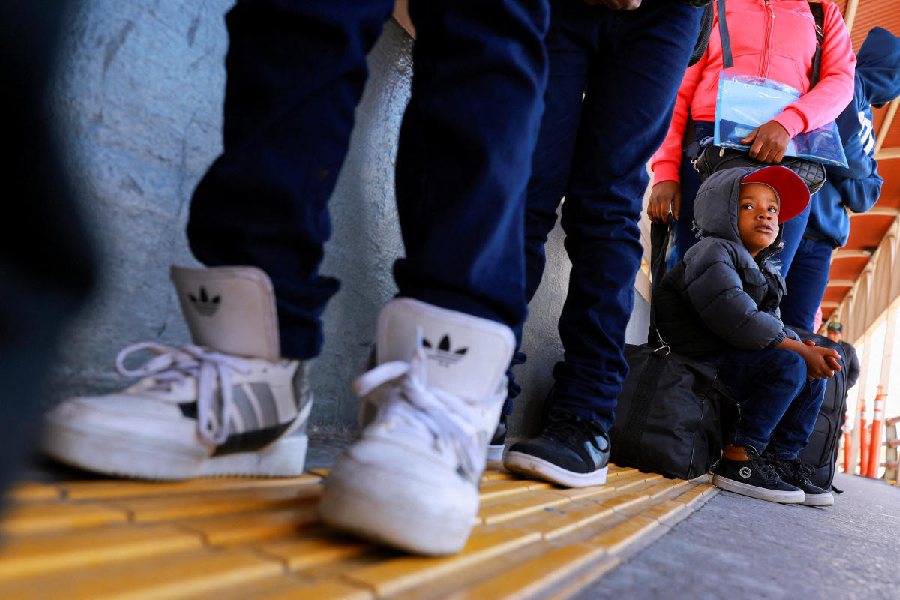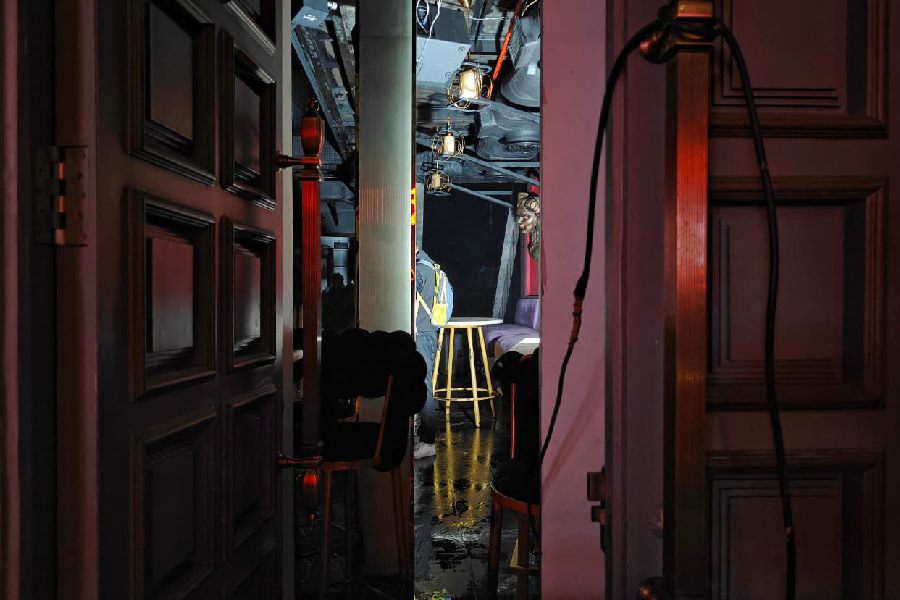Prime Minister Narendra Modi's announcement on Tuesday evening that currency notes in denominations of Rs 1,000 and Rs 500 would cease to become legal tender from midnight triggered a gamut of emotions in Calcutta — from a chief minister incensed to insidious money changers fleecing foreigners. Metro reporters hit the cash trail on Wednesday to mirror the city’s moods

THE TEARS
DOCTORS AND LAWYERS
The first thing an eminent Calcutta surgeon did on reaching his workplace on Wednesday morning was consult the head of the private hospital’s accounts department on what to do with the cash pile of Rs 40 lakh he had at home.
“How do I transfer the money into my account?” he asked.
Ditto many other doctors who had previously never worried about being called into question for accepting payments in cash and not showing it in their financial statements. Some called their tax consultants and the rest their lawyers to find out how to save their cash from becoming trash or tax fodder.
“A doctor friend of mine told me that he is planning to pay his staff their salaries for one year so that they can deposit those amounts in their individual accounts,” said an official of a private hospital along the Bypass.
Some doctors were advised by their consultants to wait and watch. “You have 50 days, relax!” a consultant quoted his financial adviser as saying.
Not all doctors are losing sleep, though. “I am paid by the hospital I work in, just like someone in a corporate set-up. I don’t have anything to be worried about but those with cash at home must be jittery,” said a consultant working full-time at a private hospital.
A few contemplated making flight bookings in cash for foreign vacations.
At least two lawyers with unaccounted for cash called their friends in the Supreme Court to find out whether anyone had filed a PIL against the Modi government’s decision!
PATIENTS
Discharge cancelled and admission refused. This was the story across private hospitals on Wednesday.
Payment counters at several hospitals displayed notices saying that notes in denominations of Rs 500 and Rs 1,000 were no longer accepted, leaving those with spending limits on their debit or credit cards in a bind.
Some hospitals had sent out text messages on Tuesday evening, advising families of patients lined up for discharge the next day to pay in cash until midnight. Some managed to beat the deadline but most couldn’t.
Bangladesh nationals in Calcutta for treatment suffered the most. Halima Khatun Parul, 37, of Munsiganj in Bangladesh was to be discharged from Peerless Hospital at noon. She had undergone laparoscopic surgery and the bill for her treatment was Rs 1.29 lakh, out of which about Rs 30,000 was due. “My husband has Rs 500 notes with him that the hospital wouldn’t accept. He has gone to New Market to exchange the money,” said Halima.
Thalassaemia patient Akhtar Hossain, 33, from Dhaka needed to get admitted to the same hospital for spleen surgery, but his family didn’t have enough Rs 100 notes to make the required deposit. Luckily for Akhtar, the hospital made an exception for him.
“We can admit a patient without a deposit. But what do we do when someone is ready for discharge and the person’s family can’t pay in anything other than cash? said an official of another private hospital.
FOREIGNERS
Gopal Kanti De, 60, from Chittagong in Bangladesh landed in Calcutta on Tuesday night with two family members. He had three confirmed tickets on the Sealdah Rajdhani Express to New Delhi for Wednesday, but has decided to return home rather than proceed to the capital for a scheduled medical check-up. “I have cancelled our train tickets and we are returning to Bangladesh on Thursday. There is no other option because I can only pay in cash,” he said.
Michael Muennich, a German tourist, arrived in India with his parents in the middle of October. He learnt about Rs 500 and Rs 1,000 notes ceasing to be legal tender when he went to the reception of his Calcutta hotel on Wednesday morning to settle the bill. “I thought the lady at the reception was joking!” said the 43-year-old from Berlin.
Muennich then went from one foreign exchange shop to another but could not get two Rs 1,000 notes changed. “One shop near New Market was ready to accept a Rs 500 note provided I settled for Rs 400 in exchange value,” he recounted.
SYNDICATES
A New Town syndicate leader’s iPhone hasn’t stopped ringing since Tuesday evening. “I have received at least a hundred calls from my boys. They want to know what to do with the Rs 500 and Rs 1,000 notes. I have asked them to hold on to the notes as of now,” he said.
Syndicates that supply construction material and labour to various sites — often using force to get the contracts — deal only in cash and charge more than the market rates. One syndicate leader said he had advised all his acolytes to deposit small amounts of money in their family members’ bank accounts from November 11. “As of now, we have almost Rs 40 lakh in cash,” he admitted.
TEA COMPANIES
Tea estates in the Dooars and Terai region withdraw cash from banks to pay wages to their workers every fortnight or weekly. Since Rs 20,000 is the maximum that can be withdrawn in a week till November 24, these estates are clueless how to pay wages.
“Several estates are supposed to make fortnightly wage payments in the next two to three days and have already withdrawn cash, mostly in denominations of Rs 1,000 and Rs 500. They cannot disburse these notes now,” said Sumantra Guha Thakurta, secretary of the Dooars Branch of the Indian Tea Association.
![]()
THE SCOWL
LUXURY STORES
Customers who prefer making high-value purchases upwards of Rs 1 lakh in cash were conspicuous by their thin presence at the Quest Mall on Wednesday, leaving luxury stores worried that this might be a long-term trend.
Employees of three outlets at the Syed Amir Ali Avenue mall said business was down compared to any other weekday.
“Nearly 80 per cent of our customers buy high-value goods in cash. A few of them walked in today only to enquire if we were still accepting currency in denominations of Rs 500 and Rs 1,000,” said a salesperson.
The manager of another store said he feared there would be little business till at least the end of this week. “Customers buying goods worth Rs 1 lakh or even Rs 1.5 lakh in cash is not unusual in our store. The decision to put Rs 500 and Rs 1,000 notes out of circulation might deter these people from making high-value purchases and we will be hit hard.”
Goods worth less than Rs 2 lakh can be bought without the buyer producing a PAN card. But Modi’s “surgical strike” on hoarding currency may have put paid to the old ploy of turning “black” money “white” with a high-value cash purchase such as a luxury watch, a pair of shoes or whatever.
MAMATA BANERJEE
Chief minister Mamata Banerjee was angry. Very angry.
In a series of tweets, Mamata targeted Prime Minister Modi for triggering what she said was a “disaster”.
“Roads are closed, markets shut, patients not being admitted to private hospitals, millions affected,” she tweeted, comparing the decision to demonetise Rs 500 and Rs 1,000 notes with “an all-India unannounced strike”.
Midway through the criticism, she slipped in a plea. “I once more appeal to the Govt to withdraw this hasty decision,” she wrote.
FISH MARKETS
Ice was on demand more than fish in most markets on Wednesday as the sudden shortage of usable currency seemed to curb the Bengali’s craving for a piece of katla on the lunch plate.
Footfall at markets remained low through the day, although some regular buyers were saved by traders who sold fish on credit or even accepted Rs 500 or Rs 1,000 notes. At Maniktala, Ultadanga and most blocks of Salt Lake, markets bereft of the usual morning rush made for an unusual sight.
The shortage of customers forced many fish traders to procure extra blocks of ice to preserve the stocks that they would have otherwise sold off in one morning. As realisation dawned that a scowl would do them no good, many of them started accepting Rs 500 and Rs 1,000 notes rather than turn away regulars.
Retired bank employee Sudarshan Sarkar, 63, was spotted bargaining with a fishmonger at the Maniktala market. “I have only Rs 200. I left my Rs 500 notes at home thinking no one would accept them,” he said.
Prabir Choudhury, 52, bought a kilo each of prawn and topshe and handed the seller a Rs 1,000 note that was accepted.
Teacher Indira Mukherjee, buying groceries in a Salt Lake market, didn’t face any problem either. “The grocer from whom I have been buying for ages gave me dal, rice and tea and accepted the Rs 500 note I gave him,” she said.
TOLL PLAZA
Toll for a two-wheeler: Rs 5. Currency note offered: Rs 500.
Chaos reigned at the toll booths on Vidyasagar Setu on Wednesday, queues in multiple lanes extending far beyond the usual. Every toll gate had about 20 vehicles in line around noon, each of them interminably still.
“People in eight out of 10 cars are trying to pay the toll with Rs 500 notes. We are having a difficult time dealing with this,” an employee said.
Apurba Das, riding a motorbike, was clutching a Rs 500 note even as he waited for his turn behind three cars. “This is a government facility. If banks can accept notes of high denomination, why won’t they? I didn’t create the currency shortage, did I?” he said.
By evening, Delhi had announced the suspension of toll collection on national highways till Friday midnight. Told about the decision, an employee at the plaza said it would make no difference to traffic passing through Vidyasagar Setu.
“Toll here is collected by the HRBC, which is under the state transport department. So, the decision to suspend toll collection doesn’t apply here,” an official said.

THE STRAIGHT FACE
BANKS
A working day without much work — this summed up the mood at banks across Calcutta on Wednesday. Carom, cups of tea and chatter kept employees busy at several bank branches. Interns at the Salt Lake branch of a private bank had all the time to ask questions and get familiar with the banking system, something they wouldn’t have been able to do on a normal weekday.
“We waited for instructions for the better part of the day,” said a senior employee of a bank in BBD Bag.
Many bank branches received cash in notes of Rs 100 denomination, some more than once. A list of FAQs from the Reserve Bank of India was circulated too through the head offices of banks later in the day. “There will be additional counters on Thursday for both deposit and exchange of notes,” said an employee of a nationalised bank in central Calcutta.
In the evening, the relaxed mood changed after the RBI announced that banks would be open this Saturday and Sunday. Outside a private bank on Central Avenue, two employees were heard grumbling about their cancelled plans for the weekend.
HOME DELIVERY
Chowman, a restaurant chain serving Chinese cuisine, equipped delivery boys with card-swiping machines to beat the cash blues. “We are telling customers that they can pay with cards even for home delivery,” said the manager of the Chowman outlet at Golf Green.
An employee at the Pizza Hut outlet on Camac Street said card-swiping machines were used for home delivery since morning, but the service was stopped in the evening because of a technical glitch.
Several online shoppers told Metro that their cash-on-delivery orders from e-commerce giants had been put on hold. Food delivery app Swiggy did the same.
“We have switched off the COD option. We are trying to find a way to make things more convenient. For now, we are sticking to online payments through debit or credit card and wallets like Paytm and Mobikwik,” said Anuj Bothra, city head, Swiggy.
Swiggy does not use card-swiping machines for payment at the point of delivery.
FUEL PUMPS
The gas station opposite Acropolis Mall on the Ruby-Rashbehari Avenue connector had received 411 notes of Rs 1,000 denomination and 1,528 notes of Rs 500, more than double the usual daily figure, before noon.
By afternoon, employees at the station were heard asking everyone to buy fuel in multiples of Rs 500 or Rs 1,000 if they were not carrying Rs 100 notes.
“What can we do? Everyone is giving only Rs 500 and Rs 1,000 notes. We have run out of change,” said Biswanath Saha, an employee at the gas station.
According to owner Amarendra Kumar Goswami, even autorickshaw drivers had switched from paying for fuel with a bunch of Rs 10 notes to Rs 500 for each refill.
MILK BOOTHS
A booth located near the Karunamoyee bus stop in Salt Lake ran out of stock barely three hours after opening on Wednesday morning.
“There was a long queue since morning. Most people would grab a one-litre pack and hand me a Rs 500 note. I had a tough time giving change,” said Swapan Ghosh, who runs the Mother Dairy outlet.
Not only residents, even people headed for office made a beeline for the milk booth to get their Rs 500 notes broken into currency of smaller denominations. “I had read on Facebook that milk booths would accept Rs 500 notes. I asked someone at the bus stop about the nearest booth and reached here,” said Praveen Kumar, an engineer employed with a construction company.
![]()
THE WINK
GOLD RUSH
For some jewellers in town, Tuesday night was as big as Dhanteras. “We received calls from several regular customers just before closing time, requesting us to stay open for a few hours. They came and bought a whole lot of jewellery,” said the cashier of a central Calcutta jewellery store.
And, yes, all the payments were in cash.
“What can we do if they insist (on paying in cash)? You can’t turn back a customer,” a jewellery store owner told Metro on Wednesday, winding up with a wink.
MONEY CHANGER
Rs 400 for Rs 500 was the going exchange rate at many money changers on Marquis Street, the area that serves mainly Bangladeshi nationals. Not only were they making bigger profits, some were also seen pushing Rs 500 and Rs 1,000 notes with a take-it-or-leave-it line. For foreigners who desperately needed Indian currency to pay for basic necessities like food and lodging, there was little option but to accept whatever the money changers offered.
Metro followed a man in a T-shirt and a pair of denims to a small foreign exchange shop and heard the following conversation:
- Money changer: We can only give you Rs 500 and Rs 1,000 notes.
- Foreigner: But I want Rs 100 notes.
- Money changer: No, we don’t have any. You take Rs 500 and Rs 1,000 notes or go elsewhere.
A man accompanying the foreigner advised him to accept the offer. “Take it. It’s the same everywhere. We will find some way.”
The customer paid Rs 10,000 worth of Bangladesh taka and accepted Rs 500 and Rs 1,000 notes in exchange.











